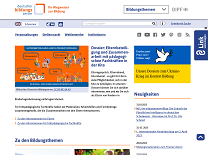Educational manuals – Centre Population et Développement (CEPED) – english information https://www.bildungsserver.de/bisy.html?a=7209&spr=1
This website of the CEPED (Centre Population et Développement) offers full texts about different educational topics of individual countries; Togo (Identités sexuées et relations entre personnages dans les manuels togolais de mathématiques), Tunisia (Les manuels scolaires en Tunisie reflètent-ils la réalité tunisienne ?), Cameroon (Évolution des rapports de genre au fil du cycle primaire dans les manuels de mathématiques au Cameroun), Madagascar (Les activités économiques et domestiques, masculines et féminines, dans les manuels scolaires de Madacasgar), Mexico (Le masculin et le féminin dans les images des manuels mexicains destinés aux “ Indigènes „), Senegal (L’implicite hiérarchie des identités culturelles dans deux manuels de lecture sénégalais.)

